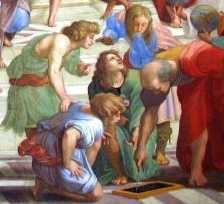mp3
Admirable convert, monk, bishop and doctor
Fulget in cælis célebris sacérdos,
A celebrated priest shines in the heavens,
stella doctórum rútilat corúsca,
the brilliant star of all wise doctors glows red,
lumen intáctum fídei per orbis
scattering the intact light of faith
clímata spargens.
over every clime of the world.
2. Cive tam claro, Sion o supérna,
Of so illustrious a citizen, O heavenly Zion,
læta dic laudes Dómino salútis,
utter joyful praises to the Lord of salvation
qui modis miris sibi vinxit ipsum
who in His wonderful ways bound this saint
lúmine complens.
perfecting him by light.
3. Hic fidem sacram vigil usque firmat,
This vigilant sentry confirms the holy faith at every point,
arma et errórum súbigit poténter,
and powerfully subjugates the weapons of errors,
sórdidos mores lavat et repéllit
washes and repels sordid habits
dógmate claro.
by clear teaching.
4. Qui, gregis Christi speculátor almus,
Nourishing watcher of Christ's flock,
énites clero monachísque forma,
be an outstanding model of cleric and of monk,
tu Dei nobis fáciem benígnam
make favorable the face of God towards us
fac prece semper.
always by your prayer.
5. Laus, honor, virtus Triádi beátæ,
Praise, honor, power to the blessed Triad,
cuius in terris studuísti amánter
whose glory you lovingly desired on earth
alta scrutári nitidáque in astris
on high to examine carefully in the stars
luce potíris. Amen.
the shining light you have received and grasped.
Attributed to the monk Eckbert of Schönau, 12th century.
You might wonder why Augustine's name does not appear. Fr. Lentini explains: "Not finding a hymn proper to St. Augustine of elevated enough tailoring, this hymn has been used, composed in honor of St. Gregory the Great, but well adaptable with some retouch." Some of the retouch that Lentini did was because the meter was not consistent. However, he defends Eckbert: "The author, a demonstrable expert, has certainly intended to compose a metric hymn; perhaps the metric defects are attributable to later hands."
In the first strophe, I previously translated lumen intáctum as "a lamp untouched," which I noticed was different from the translation of the erudite Jesuit Martin O'Keefe, who opts for "light of faith undiminished". One of the meanings of intáctum is "virgin," which we know Augustine most certainly was not, having fathered a child by a relationship previous to his conversion. But intactum modifies lumen "the light" and not sacérdos or stella. I assume we are to marvel at the mystery of a light which is "scattered" but yet remains "intact."
The last two lines of verse 2 were originally:
iubila, terra, meritis protecta
rejoice, O earth, protect by the merit
praesulis almi.
of so kind a patron.
Lentini changed these lines especially in honor of Augustine. He replaced it with the present text to "mention Augustine attaining to the mysterious ways of God."
The doxology (last verse) is new as well, "the intent of which is to recall the admirable writings of the Saint on the august mystery of the Trinity."
“Let us run with this thought experiment for a moment.”
-
Peter Kwasniewski invites a mind experiment. Let us run with this thought
experiment for a moment. Imagine the Divine Liturgy of Saint John
Chrysostom as o...
19 hours ago

1 comment:
"Cive tam claro" is an ablative absolute, it means "since this citizen was so illustrious" or "this citizen being so illustrious".
"Laeta" modifies "Sion", not "laudes".
Add "to himself" to "bound this saint".
"Enites clero monachisque forma" is indicative not imperative, "clero monachisque" are plural datives. "Thou art an outstanding model to clergy and monks."
Post a Comment